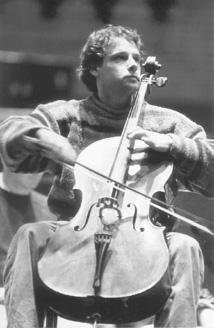Pieter Wispelwey - Interview by Philip Anson
/ December 1, 1997
Version française...
 Dutch cellist Pieter Wispelwey has attracted a loyal
following in Quebec over the last two years through appearances at
the Lanaudière Festival and the Ladies' Morning Musical Club. The
34-year-old's playing is a model of intensity and integrity,
eschewing all superficial display and cheap effect. Wispelwey will
be playing twice in Montreal in December, with the Orchestre
Métropolitain and again with the Ladies Morning Muscial Club. Last
week he spoke to La Scena Musicale from England, where he is
assisting the post-production editing of his recent Channel Classics
recording of Schumann's Cello Concerto (scheduled for release
in January 1998). Dutch cellist Pieter Wispelwey has attracted a loyal
following in Quebec over the last two years through appearances at
the Lanaudière Festival and the Ladies' Morning Musical Club. The
34-year-old's playing is a model of intensity and integrity,
eschewing all superficial display and cheap effect. Wispelwey will
be playing twice in Montreal in December, with the Orchestre
Métropolitain and again with the Ladies Morning Muscial Club. Last
week he spoke to La Scena Musicale from England, where he is
assisting the post-production editing of his recent Channel Classics
recording of Schumann's Cello Concerto (scheduled for release
in January 1998).
SM: Can you tell us about your new recording?
PW: I recorded this Schumann concerto about three weeks ago in
Holland with the Australian Chamber Orchestra and the Netherlands
Wind Ensemble. The interesting aspect of this recording is that we
did not have a conductor, yet I think the orchestra is more together
in my recording than in any other Schumann cello concerto I've
heard.
SM: Do you always edit your own recordings?
PW: I've been involved in editing my last four recordings because
no one else knows exactly the result I want. I make hundreds of
interpretive decisions and the engineers punch them in.
SM: Cellist Christoph Coin and Philippe Herreweghe just
released a period-instrument recording of the Schumann Cello
Concerto on harmonia mundi. How will your recording
differ?
PW: The Australian Chamber Orchestra, which is about the same
size as the Orchestre des Champs-Elysées, occasionally plays on
period instruments, but for this recording gut strings would have
been too expensive and impractical. Though we use modern
instruments, I think our recording is overall more authentic and
transparent sounding than harmonia mundi's. Coin's playing is very
larmoyant, quite old-fashioned. It takes us back to the style
of the 1920s and 1930s, not back to the 19th century. He uses lots
of nervous vibrato. I prefer a purer sound with little or no
vibrato.
SM: You just won a Diapason d'Or award for the Poulenc and
Chopin sonata disc (Channel Classics CCS 10797). What effect does
that have?
PW: Awards are very gratifying. Commercially, the best thing is
to get all the awards for one recording. Of course these awards are
somewhat arbitrary: the Chopin/Poulenc won a Diapason d'Or but in
Repertoire magazine it was criticized.
SM: You've been looking for a permanent cello to call your
own. What are you playing now?
PW: At this very moment somewhere over the South Atlantic there
is a cello flying to me. It will land in Rome and I'll pick it up
there after my Montreal performances. I can't tell you any more
about it except that it is a Contino cello, quite rare and valuable.
I can't afford to buy it myself but it belongs to an organisation
that will loan it to me if I can find a sponsor. In Montreal I'll
use my normal French anonymous cello, which I love.
SM: You once described playing cello with an orchestra as
"combat".
PW: Yes, concertos are often written so that the cellist has to
struggle against the orchestra like a tormented hero. The audience
derives pleasure from watching the physical entertainment. Nowadays
there is so little time to rehearse that the soloist ends up
struggling against the conductor. Really, it is just a lucky break
when the performance turns out well.
SM: So you prefer solo recitals?
PW: Artistically, solo performances are more satisfying, but
playing with large ensembles is chaotic and exciting. I enjoy
combative situations, to survive in difficult circumstances and
still get a musical message across.
SM: What about your style and influences?
PW: Stylistically, lyricism is important. The instrument should
approach the expressivity of the voice. I was influenced not only by
the early-music movement but also by Dietrich Fischer-Dieskau, who
taught me that one can be dramatic and expressive without sounding
tormented or heavy. I really dislike heavy playing, dragging the
tempo just to make a point. I like Steven Isserlis's cello playing.
I love Yo-Yo Ma, his honesty ‹ but not his interpretations!
SM: Any new recording projects?
PW: Next month I'll be recording the Bach suites for the second
time. I expect the new recording to be livelier, freer and more
expressive since I am now more experienced and less intimidated by
the microphone. Next year I'll record the Lutoslawski and Dutilleux
concertos.
SM: You don't play in the United States much.
PW: There are
prospects for engagements with the Boston Symphony and the Chicago
Symphony, but the USA is a strange country. They prefer superstars
and child prodigies, either the very young or extremely old. I find
this silly. I feel much more at home and welcome in Australia, South
America and Canada.
Pieter Wispelwey plays the Schumann
Cello Concerto with the
Orchestre Métropolitain on 2 December at Place des Arts and on 4 and
5 December on tour. On December 7 at 3:30 Wispelwey and his duo
partner Paolo Giacometti play Debussy, Franck, Hindemith, Poulenc
and Webern at Pollack Hall for the 932-6796 Ladies' Morning Musical
Club.
Version française... | 

